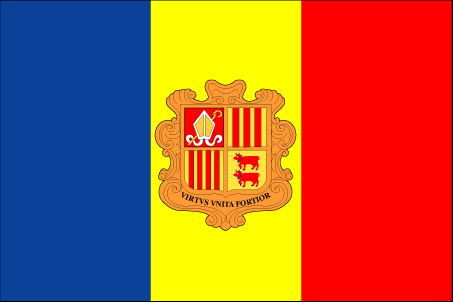Difference between revisions of "About Andorra"
(Created page with "{{#eimage:http://upload.wikimedia.org/wikipedia/commons/thumb/3/36/Esgl%C3%A9sia_de_Sant_Joan_de_Caselles_-_10.jpg/800px-Esgl%C3%A9sia_de_Sant_Joan_de_Caselles_-_10.jpg|410x57...") |
|||
| Line 1: | Line 1: | ||
| − | {{#eimage:http:// | + | {{#eimage:http://www.worldatlas.com/webimage/flags/countrys/zzzflags/adlarge.gif|410x579px|thumb|'''The official flag.'''<BR/>Source: worldatlas.com.}} |
The landlocked Principality of [[Andorra]] is one of the smallest states in Europe, nestled high in the Pyrenees between the French and Spanish borders. For 715 years, from 1278 to 1993, Andorrans lived under a unique co-principality, ruled by French and Spanish leaders (from 1607 onward, the French chief of state and the Bishop of Urgell). In 1993, this feudal [[system]] was modified with the introduction of a modern, constitution; the co-princes remained as titular heads of state, but the government transformed into a parliamentary democracy. [[Andorra]] has become a popular tourist destination visited by approximately ten million people each year drawn by the winter sports, summer climate, and duty-free shopping. [[Andorra]] has also become a wealthy [[international]] commercial center because of its mature banking sector and low taxes. As part of its effort to modernize its economy, [[Andorra]] has opened to foreign investment, and engaged in other reforms, such as advancing tax initiatives aimed at supporting a broader infrastructure. Although not a member of the European Union (EU), [[Andorra]] enjoys a special relationship with the EU and uses the euro as its national currency. | The landlocked Principality of [[Andorra]] is one of the smallest states in Europe, nestled high in the Pyrenees between the French and Spanish borders. For 715 years, from 1278 to 1993, Andorrans lived under a unique co-principality, ruled by French and Spanish leaders (from 1607 onward, the French chief of state and the Bishop of Urgell). In 1993, this feudal [[system]] was modified with the introduction of a modern, constitution; the co-princes remained as titular heads of state, but the government transformed into a parliamentary democracy. [[Andorra]] has become a popular tourist destination visited by approximately ten million people each year drawn by the winter sports, summer climate, and duty-free shopping. [[Andorra]] has also become a wealthy [[international]] commercial center because of its mature banking sector and low taxes. As part of its effort to modernize its economy, [[Andorra]] has opened to foreign investment, and engaged in other reforms, such as advancing tax initiatives aimed at supporting a broader infrastructure. Although not a member of the European Union (EU), [[Andorra]] enjoys a special relationship with the EU and uses the euro as its national currency. | ||
Revision as of 21:52, 15 August 2014
The landlocked Principality of Andorra is one of the smallest states in Europe, nestled high in the Pyrenees between the French and Spanish borders. For 715 years, from 1278 to 1993, Andorrans lived under a unique co-principality, ruled by French and Spanish leaders (from 1607 onward, the French chief of state and the Bishop of Urgell). In 1993, this feudal system was modified with the introduction of a modern, constitution; the co-princes remained as titular heads of state, but the government transformed into a parliamentary democracy. Andorra has become a popular tourist destination visited by approximately ten million people each year drawn by the winter sports, summer climate, and duty-free shopping. Andorra has also become a wealthy international commercial center because of its mature banking sector and low taxes. As part of its effort to modernize its economy, Andorra has opened to foreign investment, and engaged in other reforms, such as advancing tax initiatives aimed at supporting a broader infrastructure. Although not a member of the European Union (EU), Andorra enjoys a special relationship with the EU and uses the euro as its national currency.
Source: CIA World Fact Book - Andorra
